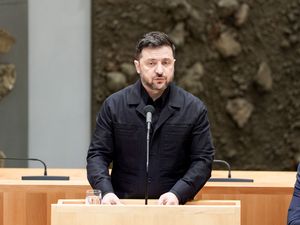Dissident Navalny predicted he would die in Russian prison, memoir shows
A critic of Vladimir Putin, Alexei Navalny died in jail in February while serving a 19-year sentence which he said was politically motivated.

Excerpts of a memoir written by late Russian opposition leader Alexei Navalny revealed he believed he would die in prison.
The New Yorker magazine published the excerpts on Friday in anticipation of the release of the book, Patriot, on October 22.
Navalny was President Vladimir Putin’s fiercest and most prominent foe and relentlessly campaigned against official corruption in Russia.
He died in a remote Arctic prison in February while serving a 19-year sentence on several charges, including running an extremist group, which he said were politically motivated.
He was jailed after returning in 2021 from Germany where he was recuperating from a nerve agent poisoning he blamed on the Kremlin, and was given three prison terms since.
Russian officials have vehemently denied involvement both in the poisoning and in his death.
Patriot was announced in April by publisher Alfred A Knopf who called it the late politician’s “final letter to the world”.
According to Mr Knopf, Mr Navalny began working on the book while recovering from the poisoning and continued writing it in Russia, both in and out of prison.
In detailing his coping strategies while imprisoned, Mr Navalny said he would “imagine, as realistically as possible, the worst thing that could happen. And then … accept it”.
For him, this was dying in prison.
“I will spend the rest of my life in prison and die here,” he wrote on March 22 2022.
“There will not be anybody to say goodbye to … all anniversaries will be celebrated without me. I’ll never see my grandchildren.”
Although he had accepted this fate, Mr Navalny’s memoir conveys a resolute stance against official corruption in Russia.
“My approach to the situation is certainly not one of contemplative passivity. I am trying to do everything I can from here to put an end to authoritarianism (or, more modestly, to contribute to ending it),” he wrote, also on March 22 2022.
In a published excerpt, dated January 17 2024, a month before his death, Mr Navalny answers the question posed by his fellow inmates and prison guards: “Why did you come back?”
“I don’t want to give up my country or betray it. If your convictions mean something, you must be prepared to stand up for them and make sacrifices if necessary,” he wrote.
As well as capturing the isolation and challenges of his imprisonment, Mr Navalny’s writing is notable also for its humour.
The late dissident recounts a bet with his lawyers over the length of a new prison sentence: “Olga reckoned 11 to 15 years. Vadim surprised everyone with his prediction of precisely 12 years and six months. I guessed seven to eight years and was the winner.”
He also marvelled at the absurdity of being made to sit for “hours on a wooden bench under a portrait of Putin” as a “disciplinary activity”.
Mr Navalny’s widow, Yulia Navalnaya, said in a statement released in April by the publisher the book was not only a testament “to Alexei’s life, but to his unwavering commitment to the fight against dictatorship,” adding that sharing his story would “inspire others to stand up for what is right and to never lose sight of the values that truly matter”.
She also said the memoir was already translated into 11 languages and would “definitely” be published in Russian.





